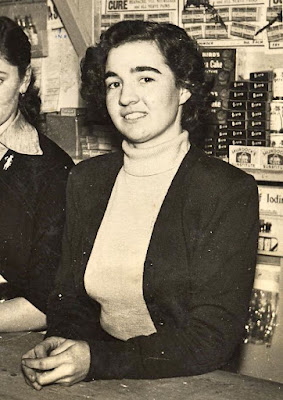My Mother was Brigid.
Today is the first time a public holiday to celebrate a woman takes place in Ireland. St Brigid's Day honours the name of the renowned and powerful 5th century Christian female leader known as Bríd (Brigid/Bridget) as well as the ancient goddess of Celtic mythology. The former was associated with fertility, peace, intellect and farming and the latter with healing, fire and of poetry.
Women in ancient Celtic Ireland had strong influential and leadership rolea that we are only now recognising.
Check out my blog article on this hidden history of Ireland from 2010:
In an era when we have pioneering women all over the world taking up positions of leadership in so many sectors as well as courageous females successfully campaigning against sexual abuse, cultural/religious discrimination and misogyny in the USA, UK, South Africa, India and Mexico and as the patriarchal establishments in Afghanistan, Myanmar, Saudi Arabia, Sudan, Turkey, Iran, Belarus and Russia use violence and 'tradition' to undo the gains of feminism, we need to have more days like today to recognise, rediscover and expose the often suppressed role of half of the world's population.
It is time to end male-only control of civil and religious governance. Such a state of affairs has only led to never-ending wars, and has through the climate/biodiversity crises brought the world to the edge of global catastrophe.
Like so many of her generation, my dearly departed and much loved mother was given the name of the popular Irish saint at her birth.
Both the Christian female leader and pagan goddess would have been proud that Bridget Agnew, popularly known as 'Bridie', took on many of their legendary traits. She was a farmer in her youth growing up with dairy cows, sheep, vegetables, fruits and flowers on the small family farm in Monaghan and later in Louth. As a young woman she managed the family's grocery shop in Dublin's city centre.
Like the Brigits of ancient times, Mom suffered but overcame male violence and the threat of societal stigma to ensure that her family got on in life. She followed in the footsteps of other great women that also experienced severe hardship to support family and country. Her mother (my grandmother) Mary Ward was the only sister to seven brothers who had to look after all their needs and keep the small family farm solvent when most of them were 'on the run' as IRA volunteers during the Irish War of Independence and the subsequent Civil War. Mom's own grandmother (my great-grandmother) Elizia Eccles spent years as a prisoner of the British Crown in the infamous female jail in Armagh as a result of her involvement in the 'Land Wars'. As a young mother Eliza refused to accept eviction and destruction of her family home by the local absentee Anglo-Irish landlord and being forced to live on the side of the road. She joined others in standing up against state brutality and unjust laws.
They and so many others like them were typical of ordinary poor women in the 19th and 20th century Ireland but their names and stories hardly ever appear in any history book.
In spite of the fact that, though their status in state and religion was as the property of their husbands and fathers, they were the ones that were the birth givers, nurturers, educators, peace-makers, home-makers, clothes-makers and food producers without whom human society would never have existed. They suffered more discrimination and violence than the men of their class in Ireland but it only now being finally recognised that they too stood with their menfolk on the frontlines as fighters, logistic personnel, community organisers and civil rights campaigners against the forces of oppression during the British period and after Independence.
Today is a day my mom would be proud of.
